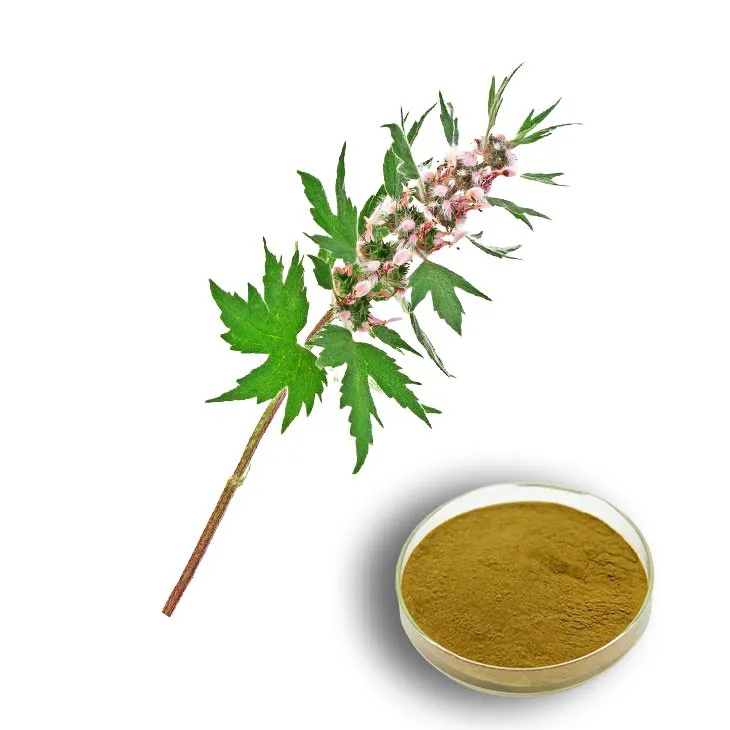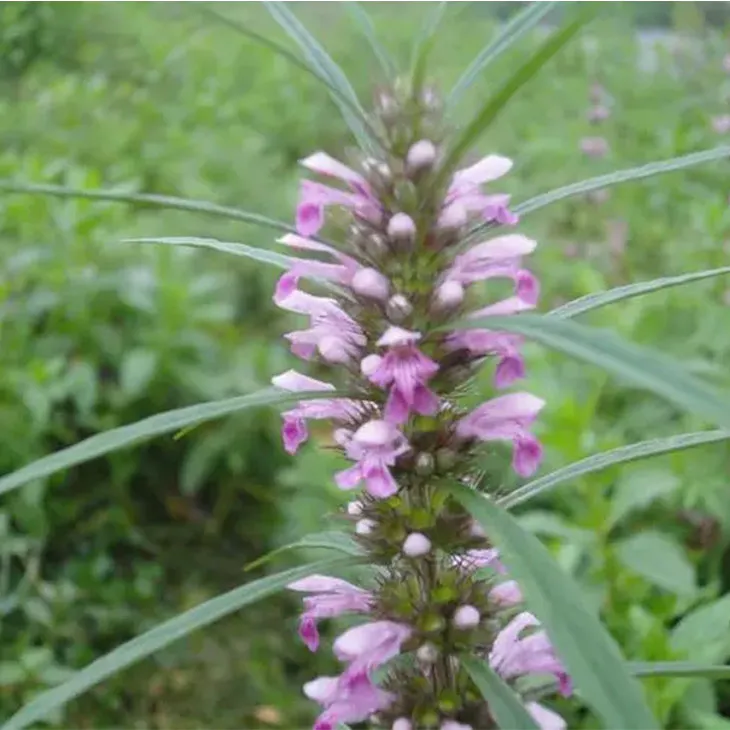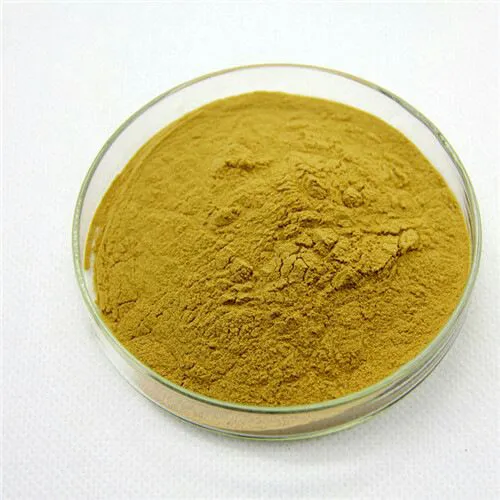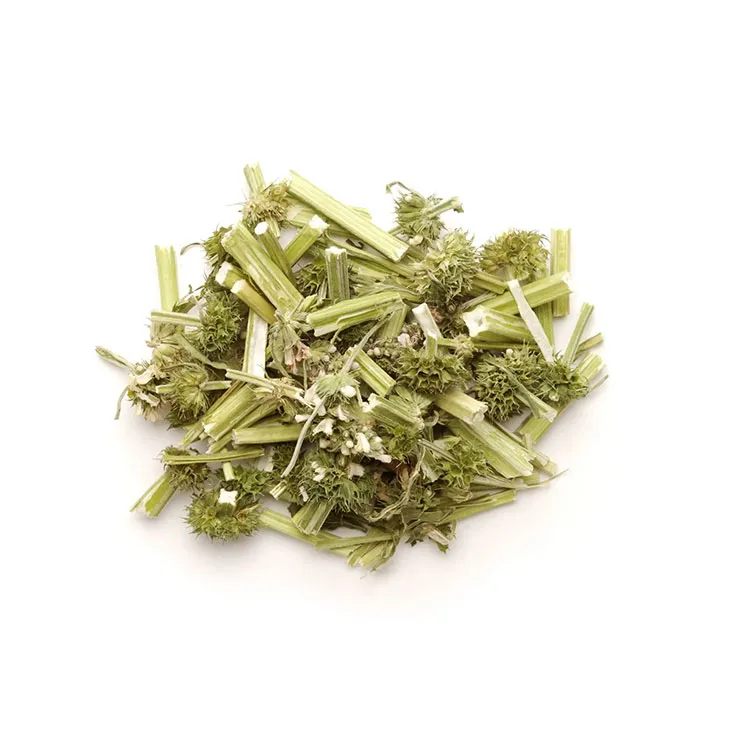- 0086-571-85302990
- sales@greenskybio.com
What is Motherwort Extract? Definition, Types, History and Nutritional Value
2024-12-09

1. Definition
Motherwort Extract refers to the concentrated essence obtained from the motherwort plant through extraction techniques. Motherwort, scientifically known as Leonurus cardiaca, is a herbaceous plant that has been the focus of extraction processes to isolate its valuable components. The extraction typically involves using solvents such as ethanol or water to draw out the active compounds present in the motherwort plant. These active compounds are then concentrated to form the Motherwort Extract. This extract is often used in various industries, especially in the fields of herbal medicine and cosmetics, due to its potential beneficial properties.

2. Types
2.1 Crude Extracts
Crude extracts are the initial form of Motherwort Extract obtained directly from the extraction process. They are relatively unrefined and may contain a wide range of substances, including many impurities. These impurities can be in the form of plant debris, other non - target compounds, and residual solvents. For example, during the extraction of motherwort using a solvent like ethanol, along with the desired active compounds, some parts of the plant cell walls, proteins, and other organic matter may also be dissolved and end up in the crude extract. However, crude extracts can still be a valuable source of motherwort's active ingredients and are sometimes used in traditional or less - refined applications.
2.2 Refined Extracts
Refined extracts, on the other hand, undergo further purification processes after the initial extraction. These processes are aimed at removing the impurities present in the crude extract. Common purification methods include filtration, chromatography, and distillation. Filtration can remove large - sized impurities such as plant particles. Chromatography is used to separate different compounds based on their chemical properties, allowing for the isolation of the desired active compounds. Distillation can be used to remove residual solvents. As a result, refined extracts are more pure and concentrated in the active compounds of motherwort. They are often preferred in modern pharmaceutical and high - quality cosmetic applications where precision and consistency are crucial.

3. History
Motherwort has a long and rich history in traditional medical systems around the world. In traditional Chinese medicine (TCM), motherwort has been used for centuries. It was considered an important herb for promoting women's health. In TCM theory, it was believed to regulate the "Qi" and blood in the female body. It was often used to treat menstrual disorders, ease childbirth pain, and promote postpartum recovery. In European traditional medicine, motherwort also had a significant place. It was used to treat various heart - related problems, which is reflected in its scientific name Leonurus cardiaca, where "cardiaca" refers to its historical use for heart conditions. It was thought to have a calming effect on the heart, reduce palpitations, and improve overall cardiac function. Native American tribes also had their own uses for motherwort. They used it for medicinal purposes, often in the treatment of various ailments related to the female reproductive system and general well - being. Over time, the knowledge of motherwort's uses has been passed down through generations and has gradually influenced modern research and applications.

4. Nutritional Value
Motherwort extract is rich in phytochemicals, which are associated with various health benefits. Flavonoids are one of the major groups of phytochemicals present in motherwort extract. Flavonoids are known for their antioxidant properties. They can scavenge free radicals in the body, which are unstable molecules that can cause damage to cells, DNA, and proteins. By reducing oxidative stress, flavonoids may help prevent chronic diseases such as heart disease, cancer, and neurodegenerative disorders. Alkaloids are another important component. Some alkaloids in motherwort may have potential effects on the nervous system. They could play a role in reducing anxiety and promoting relaxation. Additionally, alkaloids may also have implications for the female reproductive system, potentially influencing hormonal balance and menstrual regularity. Tannins are also present in motherwort extract. Tannins have astringent properties, which can be beneficial for the skin. In the context of internal use, they may also help with digestive issues by reducing inflammation in the digestive tract.
4.1 Effects on the Female Reproductive System
Motherwort extract has been traditionally associated with benefits for the female reproductive system. It may help regulate menstrual cycles. For women with irregular periods, the active compounds in motherwort could potentially influence the hormonal balance that controls the menstrual cycle. It has also been used to relieve menstrual cramps. The anti - inflammatory and muscle - relaxing properties of some of its components may help ease the pain associated with uterine contractions during menstruation. During pregnancy and postpartum, motherwort has a long - standing use. It was thought to help with the smooth progress of childbirth by relaxing the uterine muscles and reducing pain. After childbirth, it was used to promote the expulsion of the placenta and aid in the recovery of the uterus.
4.2 Effects on Cardiovascular Health
As mentioned earlier, motherwort has a historical connection to heart health. The phytochemicals in motherwort extract may contribute to maintaining a healthy heart. Some of the compounds may help lower blood pressure. By relaxing the blood vessels, they can reduce the resistance to blood flow, thereby decreasing blood pressure levels. It may also have a positive effect on heart rate. Motherwort extract could potentially regulate an abnormal heart rate, reducing palpitations and promoting a more regular cardiac rhythm. Additionally, the antioxidant properties of the phytochemicals in motherwort can protect the heart from oxidative damage, which is a factor in the development of heart disease.

FAQ:
What are the main extraction methods for Motherwort extract?
Common extraction methods include solvent extraction (such as using ethanol or water as solvents), and sometimes supercritical fluid extraction may also be used. Solvent extraction is more traditional and widely used. Ethanol extraction can effectively extract many active components from motherwort, while water extraction is a more natural and safe method for those who are concerned about solvent residues. Supercritical fluid extraction, usually with carbon dioxide, can produce high - quality extracts with relatively pure components.
How does Motherwort extract affect the female reproductive system?
Motherwort extract contains certain phytochemicals that may help regulate the menstrual cycle. It might have a role in relieving menstrual cramps and premenstrual syndrome (PMS). Some studies suggest that it can also have a positive impact on hormonal balance in women, which is important for overall reproductive health. However, more research is still needed to fully understand all of its mechanisms and effects.
Can Motherwort extract be used for cardiovascular health?
Yes, it may be beneficial for cardiovascular health. Some of the phytochemicals in motherwort extract are thought to have properties that can help lower blood pressure, reduce blood lipid levels, and improve blood circulation. For example, it may have a mild vasodilatory effect, which can contribute to better blood flow. But again, it should not be used as a substitute for medical treatment without consulting a healthcare professional.
Are there any side effects of using Motherwort extract?
There can be potential side effects. Some people may experience allergic reactions to motherwort extract, especially those with allergies to plants in the same family. In addition, excessive use may cause some gastrointestinal discomfort, such as nausea and diarrhea. Pregnant women should avoid using motherwort extract as it may have an impact on the fetus. People with bleeding disorders or those taking blood - thinning medications should also use it with caution as it may increase the risk of bleeding.
How to choose a high - quality Motherwort extract product?
When choosing a motherwort extract product, first look at the source of the motherwort. High - quality products usually use organically grown motherwort. Check the extraction method, refined extraction methods generally produce higher - quality products with fewer impurities. Look for products from reputable manufacturers who follow good manufacturing practices (GMP). Read the product label carefully to understand the concentration of the extract, any added ingredients, and usage instructions.
Related literature
- The Medicinal Properties of Motherwort: A Comprehensive Review"
- "Motherwort Extract in Traditional and Modern Medicine"
- "Nutritional and Therapeutic Aspects of Motherwort"
- ▶ Hesperidin
- ▶ Citrus Bioflavonoids
- ▶ Plant Extract
- ▶ lycopene
- ▶ Diosmin
- ▶ Grape seed extract
- ▶ Sea buckthorn Juice Powder
- ▶ Fruit Juice Powder
- ▶ Hops Extract
- ▶ Artichoke Extract
- ▶ Mushroom extract
- ▶ Astaxanthin
- ▶ Green Tea Extract
- ▶ Curcumin
- ▶ Horse Chestnut Extract
- ▶ Other Product
- ▶ Boswellia Serrata Extract
- ▶ Resveratrol
- ▶ Marigold Extract
- ▶ Grape Leaf Extract
- ▶ New Product
- ▶ Aminolevulinic acid
- ▶ Cranberry Extract
- ▶ Red Yeast Rice
- ▶ Red Wine Extract
-
Cat Claw Extract
2024-12-09
-
Plantain extract
2024-12-09
-
Beetroot Powder
2024-12-09
-
Stevia Extract
2024-12-09
-
Ginseng Root Extract
2024-12-09
-
Fenugreek Extract Powder
2024-12-09
-
Troxerutin
2024-12-09
-
Tongkat Ali Extract
2024-12-09
-
Polygonum multiflorum extract
2024-12-09
-
Maca Extract
2024-12-09





















